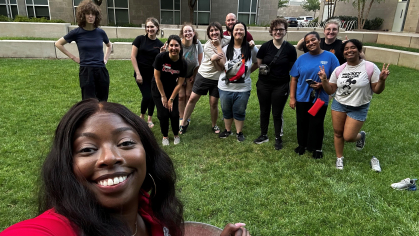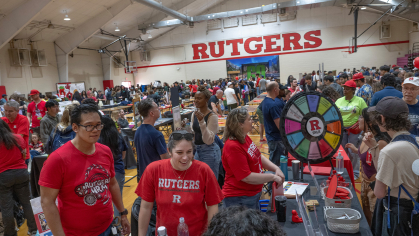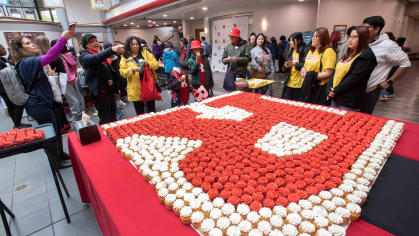Honoring the Dead While Social Distancing
Rutgers experts explain how COVID-19 has upended burial rituals, ability to find closure
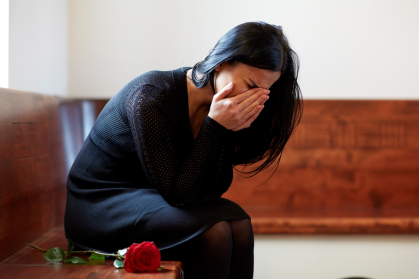
Jennifer St. Pierre watched from her Somerset County home as the motorcade slowly made its way down the street.
A beloved neighbor had died from complications of COVID-19. Instead of a wake and funeral, the line of cars stopped briefly and the wife and son emerged, masks on. The hearse opened to reveal the casket and on it they placed a rose from a mourning bouquet, eventually taking another and placing it on the front step, as St. Pierre and her neighbors, all paying respects from the safety of their steps and windows, watched in silence.
A few minutes later, the procession continued.
It was not the send-off he deserved, St. Pierre said.
“I feel like I haven’t been able to properly honor him,” said the Rutgers Business School-Newark and New Brunswick alumna and communicator with Rutgers-New Brunswick. “I worry his widow and son won’t get to witness the breadth of the loss the neighborhood feels because we didn’t get to gather and comfort them.”
Social distancing is forcing grieving families to alter rituals associated with death and burial – regardless of whether they died from the virus. No shoulders to cry on, no company to share food and memories, and in cases of those infected with COVID-19, no familiar hands to hold before they die or the ability to shroud the departed.
Losing a loved one is painful, said Stuart Charmé, a professor of philosophy and religion at Rutgers University-Camden, but being unable to say goodbye in the manner you planned adds to the agony. It’s a cold COVID-19 reality that he can speak to both as a scholar and a bereaved family member.
This week, he mourned with his wife the loss of her mother and father within days of one another – his mother-in-law from a condition related to Parkinson’s and his father-in-law from COVID-19, which he likely contracted by making daily visits to his dying wife’s bedside instead of self-isolating in his independent-living apartment.
“One of the things that was very clear in my wife’s vision of the end of her mother’s life, was that we would be able to gather together in person to tell her how much she is loved and say goodbye,” he said.
Instead of being able to visit in person, his wife and daughters had to make do with a new death ritual that’s become a byproduct of the pandemic: a FaceTime goodbye.
“By the time we realized it was time to do this, my mother-in-law was already unconscious, and I wasn’t sure about what we were doing. If we were there in person, we would have been able to touch her hand and kiss her forehead,” he said. “But it was still surprisingly touching. We said, ‘Grandma, we love you,’ 'I love you, mom,' and ‘Goodbye, Grandma.’ This felt like as good a substitute as we were going to get, and we were able to express the emotions we would have expressed in person.”
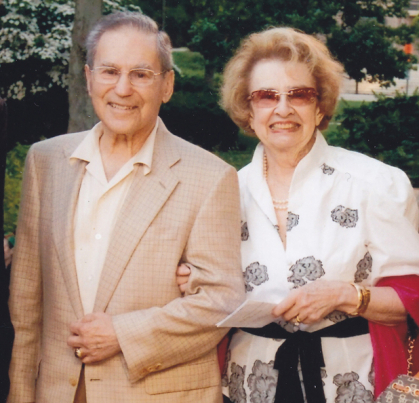
Charmé’s family honored the nursing home’s no visitation policy but Omar Dewachi, an associate professor of medical anthropology with Rutgers-New Brunswick’s School of Arts and Sciences, said suspicion and fear of inequitable medical treatment could lead devout religious communities and immigrant groups to forgo testing to keep loved ones home instead of dying alone. Social distancing rules could also be disregarded which was the case, he said, in West Africa during the Ebola virus where death rites including holding and even kissing the body spread the virus.
“Many people were not reporting health problems or Ebola-like symptoms, fearing people would come in, take that body and they would never see that person again,” said Dewachi, who worked as a physician in Iraq and teaches courses on the history of epidemics. “There were a lot of people who believed not only will they not have closure, but that the dead would not have closure.”
To avoid similar issues during this pandemic, Dewachi said community and religious leaders and funeral homes need to come up with safe alternatives.
“In Muslim communities, you have to wash the body and wrap it in a piece of cloth before loved ones come together to bring the body to burial, which has to be fast,” he said. “People will be very worried that the soul will not be rested if the burial is delayed or if a person is temporarily buried with other bodies.”
Similarly, Christian and Jewish traditions call for close proximity with the dead, largely to help those left behind confront their loss, Charmé said.
“This is not something you can put out of your mind. You have to face it. Being in the presence of the person who has died and their casket is the reality of death,” he said. “These traditions want you to experience that and then give you a set of rituals to enable you to integrate the loss into your life.”
However, events such as repast and shiva, where survivors find refuge in their community, are not possible in person with gatherings limited to less than 10.
“One of the things death does to the survivors is it isolates them because their loss exceeds the loss of others. They feel alone, raw and vulnerable,” he said. “These rituals try to redirect some of that isolation.”
Some families are opting for virtual versions of these gatherings to tide them over until shelter-in-place orders are lifted. A Zoom shiva didn’t feel right for his family at first, said Charmé, but after several days home alone with their grief, they changed their minds and contacted their rabbi to set it up.
"We would prefer to be literally surrounded by friends and relatives, to feel their arms holding us and supporting us as we move through the mourning process,” he said. "However, my wife and I felt we needed some kind of religious ritual with the people who care about us to share our loss and pay tribute to her parents’ lives.”
